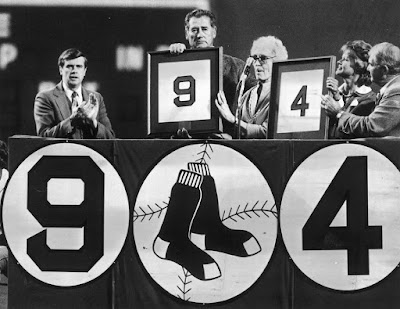
The Boston Red Sox organization (known as the Boston Americans from 1901–1907) began in 1901, as one of the original franchises of the American League.
Yet, with the recent honoring of Wade Boggs’ No. 26, the Red Sox have now retired the numbers of just nine former players: Ted Williams (9), Joe Cronin (4), Bobby Doerr (1), Carl Yastrzemski (8), Carlton Fisk (27), Johnny Pesky (6), Jim Rice (14), Pedro Martinez (45), and Boggs (26).
For a team that has been in existence for well over a century, this recognition has been bestowed upon relatively few former players. The Red Sox have reserved the distinction for a privileged few, making it a truly unique honor.
For comparison, the New Yankees will have retired the numbers of 20 former players once Derek Jeter’s No. 2 is inevitably honored.
Through the first few decades of the 20th Century, baseball uniform numbers were assigned according to batting order. A few years later, some teams correlated numbers with position played, and eventually a looser system was adopted league-wide: the higher the number, the lower the status, with single digits reserved for “everyday players.”
So, the great players from baseball's early days were typically assigned single-digit numbers.
Though they weren’t the team’s earliest stars, Williams (9) and Cronin (4) were the first two Red Sox players to have their numbers retired by the club. Yet, the pair weren’t honored until decades after their playing careers had ended.
The Red Sox waited util May 29, 1984, to simultaneously retire the numbers of both legendary players.
However, Cronin had retired after the 1945 season, and was inducted into the Baseball Hall of Fame in 1956.
Williams retired after the 1960 season, and was inducted into the Baseball Hall of Fame in 1966.
So, Cronin waited 39 years for the honor, while Williams had to wait 24 years.
Interestingly, Cronin died on Sept. 7, 1984, just four months after the number-retirement ceremony. He had to wait four decades for the honor, but it was better late than never. At least he lived to experience it.
The Red Sox have long employed one of baseball’s strictest policies related to the retirement of uniform numbers. To be considered, a player must have (1) played a minimum of ten years with the team, (2) been elected to the Baseball Hall of Fame, and (3) finished his career with the team.
After Carlton Fisk was elected to the Hall, the Sox dropped the final requirement from its policy in order to honor their former backstop, who finished his career with the White Sox after 11 seasons in Boston.
Two other exceptions have been made in recent years.
In 2008, the team abandoned its policy altogether with the retirement of Pesky’s number. Although he played only eight of his 10 seasons in the majors with Boston (missing the 1943–45 seasons while serving in World War II) and was not elected to the Hall of Fame, management felt that his 21 years as a player, coach, and manager — as well as his additional years of service with the club — were enough to bestow the honor upon him. Pesky was associated with the Red Sox for 61 of his 73 years in baseball.
In 2015, the Red Sox retired Pedro Martinez’s number, despite the fact that he played only seven seasons with the club. Martinez is a first-ballot Hall of Famer, who played a key role in the 2004 team’s first World Series Championship in 86 years. He is also widely viewed as one of the three greatest pitchers in team history.
Boggs’ number was not retired by the club for more than a decade after his enshrinement in Cooperstown. The former All-Star third baseman played 11 seasons with Boston, and was elected to the Baseball Hall of Fame in 2005. Yet, several players wore his number after he left Boston for the New York Yankees as a free agent following the 1992 season, the most recent being Brock Holt.
However, the team finally retired Boggs’ number in a pregame ceremony on May 26, 2016.
A total of 1,750 players have played for the Boston Red Sox, making the nine whose numbers have been retired quite extraordinary.
There are a number of former Red Sox in the Hall of Fame who have not had their number retired by the team, and some of them spent numerous years in Boston building their Hall of Fame credentials.
Among them:
Jimmy Collins (1901-1907) played seven season with Boston
Dennis Eckersley (1978-84, 1998) spent seven seasons with Boston
Jimmie Foxx (1936-42) played seven seasons in Boston
Lefty Grove (1934-1941) played eight seasons with Boston
Harry Hooper (1909-1920) spent 12 seasons in Boston
Red Ruffing (1924-1930) spent seven seasons with Boston
Tris Speaker (1907-1915) played nine seasons in Boston
Cy Young (1901-1908) played eight seasons in Boston
The Red Sox strict criteria for retiring a player’s number has prevented all of the above (as well as other greats) from achieving the honor.
This has made the distinction all the more precious, and unique, for the nine players who have earned the tribute.
